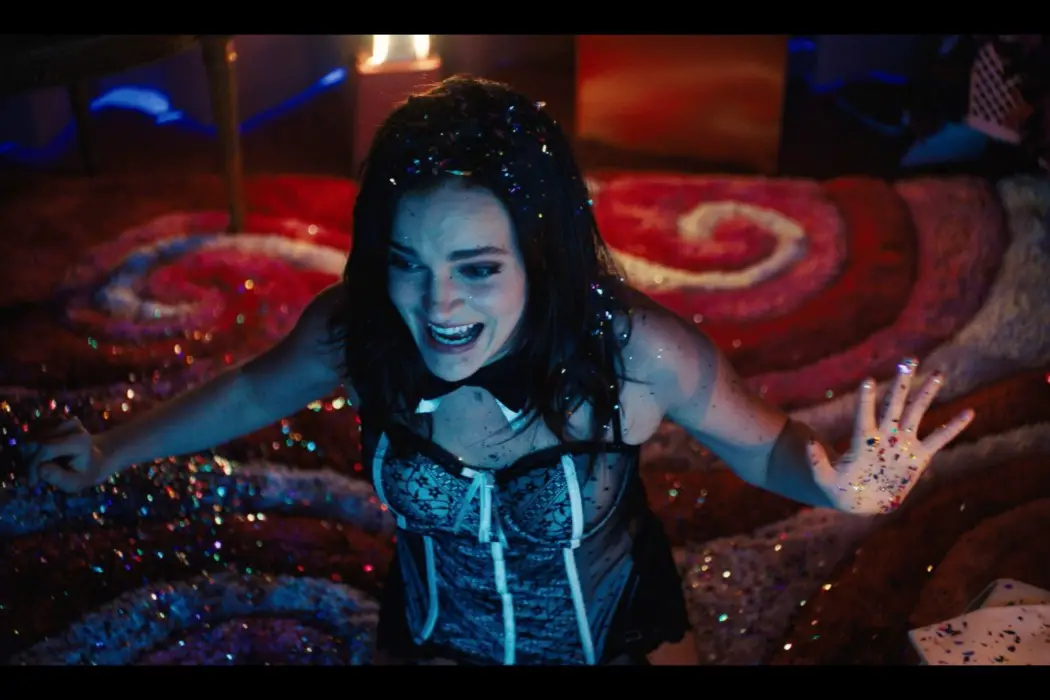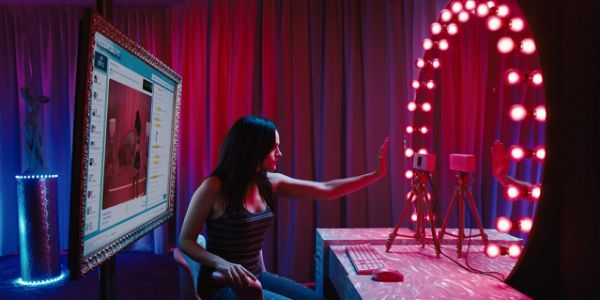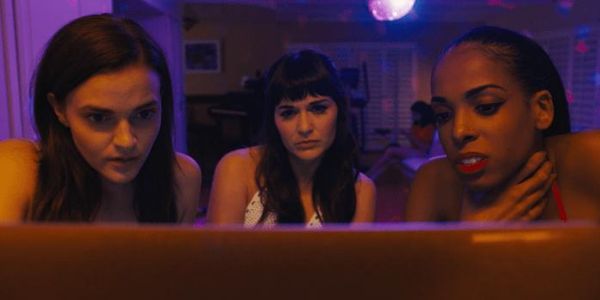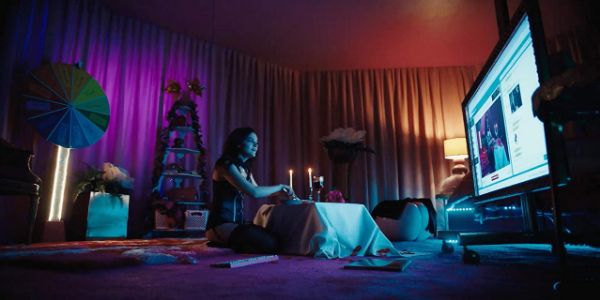CAM: The Digital Self Strikes Back

I'm a student at the University of North Carolina at…
As online personalities and interactions progressively separate themselves from any basis in reality, a particular kind of technological thriller will continue its meteoric rise in popularity. The Unfriended movies were just the start; the really creative takes on this material are beginning to pop up. Aneesh Chaganty‘s Searching, which tracked a father’s obsessive quest for his daughter, is probably the best example to date. Through its inventive use of cinematic language, the breakout thriller situated an examination of divergent identities and the digital footprint within the confines of an expert mystery. It was exhilarating, and it seemed to offer a brief look at the future of the genre.
Daniel Goldhaber‘s Cam arguably pushes these ideas even further, questioning the ownership of one’s own image, the extremity that comes with online fame, and the thin line between robotic performance and emotional involvement. It’s a thoughtful and intense film, likely to provoke viewers with its intellectual underpinnings and unpredictable air of threatening violence. If it’s significantly less horrifying than its festival reputation might indicate (as well as its status as a Blumhouse release), it’s an involving glance at an online world through an unnerving lens.
A Competitive World Becomes Dangerous
The realm of interactive sexual entertainment is the online world in question, and rising star Lola (Madeline Brewer) is the determined hero at the center of it all. As a cam girl with a genuine connection to her online community, Lola (her real name is Alice) doesn’t just want to be good – she wants to be the best of the best. Hard work has brought her close to the top 50 on Free Girls Live, and she desires nothing more than to crack the upper echelon of this competitive world.

In her shows, Lola is known for her extreme and sensational behaviors; more specifically, she has a talent for pretending to kill herself on camera. In the film’s opening scene, a commenter repeatedly asks Lola to use a knife in the show, prompting her to cut her throat. Of course, it’s all a huge trick, but it sends her soaring up the charts. In addition to her shows, Lola spends a good bit of time with two specific fans: Tinker (Patch Darragh) and Barney (Michael Dempsey). The latter is of particular importance to Lola, as he has the ability to make a star out of any girl on the website.
In her personal life, things are a little less rosy, as she still hasn’t told her mother (Melora Walters) what she does for a living. The story intensifies when a feud with another cam girl sends Lola falling down the charts, encouraging her to take drastic measures to secure her spot. When she wakes up the next morning, something even stranger has happened – it appears that her account has been hacked with an old show playing on repeat. Lola isn’t sure what to make of this, but she’s increasingly alarmed when the new version of her physically interacts with fans. Is it a mistake or something more sinister?
Immersive Portrait of a Complex Character
From here, Lola falls further down the rabbit hole, investigating this complex world and attempting to reclaim her own identity. As the plot thickens, director Goldhaber and co-writer Isa Mazzei execute an enigmatic mystery, reaching a plausible conclusion that feels even scarier than any supernatural or otherwordly conclusion could ever be. In the end, the implication of those ideas lingers long after the tension is resolved.

Cam also works as a wonderful character piece, grounded by Brewer‘s sympathetic, dynamic turn as Lola. In a lesser film, the world of cam girls and online shows would be viewed with a certain level of judgment. Here, Goldhaber and Mazzei immerse us in the details and laborious grind of Lola’s art. We see how much effort goes into every video, witnessing the creativity and risks necessary to rise to the top. We’re privy to the emotional and physical labor of this kind of sexual economy, one that requires drive and passion to navigate.
And most of all, we become deeply invested in Lola’s quest to rise to superstardom. Brewer is working in several different modes at once; in a way, Cam features a series of performances within performances. It’s a film as concerned with performativity as it is with the reclamation of online identity, which proves to be a delicious c*cktail of ideas. Whether she’s despairing at her account’s freaky fate or hustling for tokens on Free Girls, Brewer sells every facet of Lola’s personality.
Ambitious Tricks in a Simmering Thriller
As a thriller, Cam is often a bit more of a mixed bag. Its lack of visual panache can be excused because of its basis in online culture, yet I was continually reminded of Steven Soderbergh‘s iPhone-shot Unsane. Not a bad film by any stretch, but not necessarily a positive comparison in this instance. The film plays like something of a slow burn, taking its time to establish Lola’s world before the more horror-inspired elements are unveiled. That’s an inspired idea, one that’s crucial to the substantive execution of the film, even if the compact runtime leaves Goldhaber and Mazzei with limited time to generate scares.

To be fair, that mixed bag also has quite a few delights in store. I love the film’s repetitive use of very specific sounds, creating a unique sonic effect before turning it on its head. When viewers donate tokens to Lola, there’s a little burst of sound that Goldhaber plays like a maestro, practically utilizing it as the film’s spooky heartbeat. Plus, there’s the undeniable intensity of the aforementioned suicide sequences, which creates a kind of cognitive dissonance on the part of the viewer. Even when Goldhaber repeated the scene later, I was on edge.
Cam: Conclusion
As Alice goes to battle with Lola, it’s easy to get so caught up in the compelling subtext of the film that you forget to actually feel scared or threatened. In an amusing way, I almost think that’s an unexpected advantage. Goldhaber personifies the battle between the self and the cracked-mirror representation of the internet, and even when that duel has ended, the film doesn’t let us completely off the hook until the final seconds.
Still, if Cam falls just shy of total perfection, the depth and volume of ambitious ideas on display more than warrants an intimate, active viewing experience. It’s a big swing, and it’s ultimately quite successful.
What did you think of Cam? What’s your favorite horror movie of 2018 so far? Let us know in the comments below!
Cam was released worldwide on Netflix on November 16.
Does content like this matter to you?
Become a Member and support film journalism. Unlock access to all of Film Inquiry`s great articles. Join a community of like-minded readers who are passionate about cinema - get access to our private members Network, give back to independent filmmakers, and more.
I'm a student at the University of North Carolina at Chapel Hill. For 8 years, I've edited the blog Martin on Movies. This is where I review new releases, cover new trailers, and discuss important news in the entertainment industry. Some of my favorite movies- Casablanca, Inception, Singin' in the Rain, 2001: A Space Odyssey, The Wolf of Wall Street, The Nice Guys, La La Land, Airplane!, Skyfall, Raiders of the Lost Ark. You can find my other reviews and articles at Martin on Movies (http://martinonmovies.blogspot.com/).













